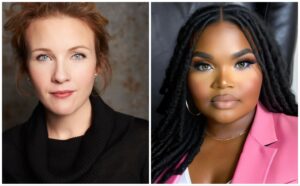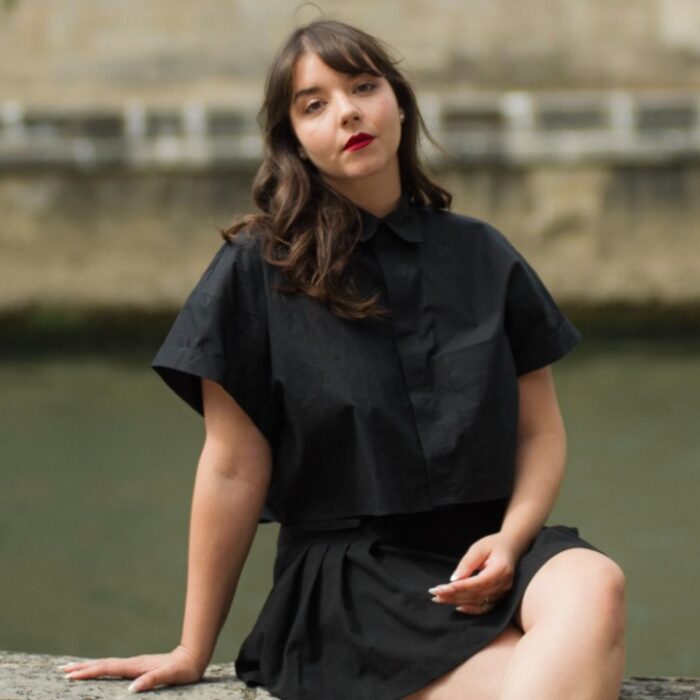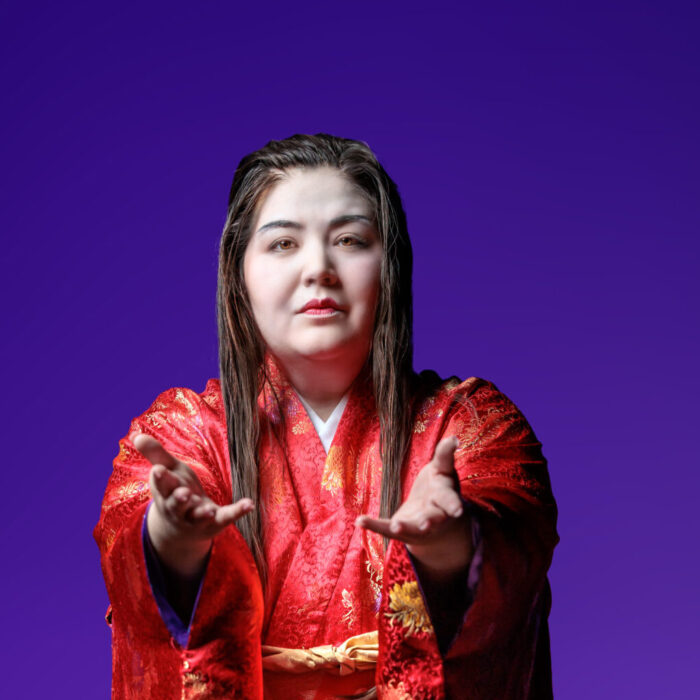
Q & A: Mezzo-Soprano Sasha Cooke & Composer Jasmine Barnes on ‘American Lament’ & How Artists Reflect Reality
By Lisa Winkler(Photos: © Sasha Cooke press / Jasmine Barnes press)
The pending arrival of 2026- the country’s Semiquincentennial, got mezzo- soprano Sasha Cooke thinking about what it means to be an American in these times of unrest and division, and what the country has represented these 250 years. Her five-city “Of Thee I Sing” recital tour begins November 4th and features the world premiere of American composer Jasmine Barnes’ song cycle “American Lament.” Both Cooke and Barnes talked to OperaWire about the process as the tour date approaches.
OperaWire: Sasha, can you describe how this concert series evolved?
Sasha Cooke: I started thinking about the idea of the unfulfilled dream of America, the ‘land of the free’ and if we will ever live up to our own potential. Jasmine’s new work “American Lament” is really the anchor of the program. Most of the text comes from a Langston Hughes poem that begins ‘Let America be America again.’ I think that sentence alone is so rich and so is so much of the text on my program.
OW: Jasmine, what inspired “American Lament?”
Jasmine Barnes: The process of writing “American Lament” with Sasha was overall therapeutic. I think that’s the best word for it. Sasha is so kind and deeply aware of the world and our responsibilities as an artist in it. We bounced some ideas of poetry around and I wrote some myself. Initially we wanted to write about what American women of today face with policies against our bodies and the lack of health care, but then we pivoted as we watched the country be affected by actions enacted by the government and justice systems. We felt the grief in this process and “American Lament” became our way to process it.
Sasha sent me Langston Hughes poem “Let America be America Again” and I read it for the first time. I was stunned. How is it that Langston wrote something about 100 years ago and it still applies so perfectly today? This poem became our framework for the piece. I thought about the disconnect of home in this country. How many of us in America want the best for it, but feel like its ideals are lost in reality? So I used some lines from the spiritual “Deep River, “God Bless America” and “The Star Spangled Banner” to show the dissent amongst identity in America. “God Bless America” and “The Star Spangled Banner” speak so proudly of America, while “Deep River” is a truly American song. As a spiritual it reflects the deep -seated nature of the country’s unwillingness to reflect and correct.
Writing “American Lament” gave me the space to process the many feelings that felt like they were growing and getting harder to cope with daily. I hope that this piece creates a space of reflection, a place to hear text written about 100 years ago and see how it remained so relevant to today. I hope it makes us question why it would still be relevant and wonder why we haven’t progressed to a place that it would be a memory of a perilous time.
OW: Each performance will also feature works by iconic 20th and 21st century American composers such as William Bolcom, George Gershwin, Samuel Barber, Jennifer Higdon, Aaron Copland, Michael Tilson Thomas, and Stephen Sondheim. Sasha, how did you select the other pieces for the program?
SC: There were simply too many American composers that I wanted to include. Pianist Myra Huang and I paired it down to what was most essential and what told the story best musically and dramatically. We also wanted to feature composers that emigrated to the US, since the musical fabric of this country is made up of the entire world. We have always described ourselves as a melting pot and yet lately it seems we are in conflict with that identity.
I hope each song invites listeners to reflect and connect in new ways to their own American experience and what America means, then and now. Sharing this journey with Myra and our audiences feels like a celebration of where we’ve been and where we’re going. The recital explores themes of identity, wandering, and renewal.
OW: Do you have any misgivings about performing at the Kennedy Center given so many artists have cancelled their performances?
SC: If anything, I only had some worries about being censored or canceled. My first inclination was to do some sort of program like “Destination Emigration Imagination” or a phrase with DEI as the acronym, but then music should always be about making everyone feel welcome and I didn’t want any agenda to color the evening. The Kennedy Center has stood for ideals I admire most of my life and I am sure it has seen various changing times. Its legacy is greater than this one blip.
OW: Jasmine, your works appear to carry strong messages related to social justice. What inspired you to make this your focus?
JB: I think quite often about how growing up I didn’t hear any classical music. Never saw an orchestra, an opera, or even a recital until I went to Morgan State. By and large, that would be considered a set up to be unsuccessful in a field that depends so heavily on prior knowledge and training. All the while, I was pursuing a career in singing opera where I quickly learned I wasn’t thin enough, light skinned enough, and too common of a voice type (soprano) to embody some of the roles I was learning. I was cast in stereotypical tropes for black women, and I noticed an issue with the canon for these issues. From that, my budding ethos began. I knew I wanted to pursue a career in classical music specifically to be the change. I wanted to write opera, and I wanted to challenge these stereotypical norms perpetuated through the art I felt so called to be a part of.
So I knew I wanted to challenge that and tell stories from authentic perspectives to change how I perceived Black women to be seen in the art form. But then when Freddie Gray was murdered, and riots broke out the day before my senior recital, I felt this immense grief. This was 2015. Many more acts of violence happened between then and 2020, and I just remember wanting so deeply to say something with my art. I thought it wasn’t enough to just challenge the canon, I wanted to challenge the country. Art has been a space for so many to be able to speak up against atrocities in society for the entirety of its existence. I like how Nina Simone said “An Artist’s duty, as far as I’m concerned, is to reflect the times.” Who will be able to tell what happened here when we are actively watching history get erased just as quickly as it’s being made? I want my art to reflect the times and speak for those who don’t feel strong enough to speak.
OW: Can you each describe how you found careers in music?
SC: My parents taught me the love of music and art. I probably heard classical from the womb as my dad especially loved to blast classical music in the house. They took me to concerts and operas. I started piano lessons and also played viola and sang in choir. One thing led to the next and with wonderful teachers on my path, the possibility of a life in opera emerged.
JB: My first instruments were percussion in the marching band in high school. Snare, Bass Drum, anything. That aided me tremendously later in college when I decided to become a music major. Rhythm is my foundation to all things music! Later in high school I played tuba and trumpet. I could probably play all of these instruments now but likely not as well.
OW: How did you decide to become a composer?
JB: When I changed my major to music at Morgan State University from architecture because the high school I went to was a STEM school (Baltimore Polytechnic Institute) and I studied architecture there. I decided to sing, with no prior training. Most schools wouldn’t allow such a thing, but the great thing about me going to an HBCU was that I was surrounded by support. I had a natural gift for singing opera, which I never even heard until I went to Morgan. I had fast success with singing, so fast it led to an injury. I started composing kind of as a therapeutic endeavor, and it became something I loved. I did recover from that injury in a semester, but I’d been bit by the composing bug and started to feel I’d pursue that as a career.
OW: Sasha, your 2025-26 season seems full. You go from concerts to operas, to even directing the family day performance of “Hansel and Gretel” with Houston Grand Opera. What special touch are you bringing to the direction? You’ll also be singing Hansel.
SC: I couldn’t be more excited about returning to Houston for one of my favorite roles. In fact, I haven’t performed much of the traditional repertory but Hansel I have. It will be very special to work with the young artists on the family day version. I hope to bring what my favorite directors bring and that’s supporting each actor’s journey.
OW: Jasmine, you are committed to educating youth about music. What are the challenges?
JB: My time at Booker T Washington High School for the Performing and Visual Arts in Dallas exposed me to what is currently going through the mindset of young musicians. The worry, the imposter syndrome, the unclear directions of what success looks like. I made it my personal responsibility to show students the many paths to a career in music, and they aren’t all performing. I showed them that most people’s journeys are tailored to their strengths and to lean into the strengths they have instead of forcing themselves into a box to fit a standard.
OW: Sasha, you’ll be debuting Carmen in Seattle. What’s challenging about that for you?
SC: Carmen is one of the roles I have been dying to play and so many mezzos I adore have performed it gorgeously. I will have to embrace the moment and discard any self-doubts. With the quintessential roles, it’s easy to play the comparison game or ‘am I good enough’ game, and that’s just not helpful. I plan to do the same sort of work I’ll do with the young artists in Houston- make the dramatic journey so potent and so personal that that will anchor me through.
OW: Finally, what do you do when you’re not singing?
SC: Exercise is a daily passion of mine. It probably came from physical health but I now know is part of my mental health, especially as a parent. When I’m home I usually return to my gym or yoga place and I love cooking.
OW: And you, Jasmine? What do you do outside of composing?
JB: I have re-discovered my love for visual art. I turn to visual art when I’m facing a writing block to think creatively in a different way. Some of my favorite mediums are pastels, watercolors and general sketching. Oh, and I love to color!
#
Program
“Of Thee I Sing”
Sasha Cooke, mezzo-soprano
Myra Huang, piano
Tour Dates:
November 4, 2025: The Kennedy Center — Washington, D.C. | Tickets
November 6, 2025: Baylor University — Waco, TX | Tickets
November 13 & 15, 2025: Park Ave Armory — New York, NY | Tickets
November 16, 2025: Isabella Stewart Gardner Museum — Boston, MA | Tickets
November 18, 2025: Matinee Musicale — Duluth, MN | Tickets
Program
“Of Thee I Sing”
Sasha Cooke, mezzo-soprano
Myra Huang, piano
I.
Aaron Copland – “At the River”
John Musto – “Recuerdo”
Leslie Adams – “Prayer”
Charles Ives – “Circus Band”
Samuel Barber – “Sure on this Shining Night”
Pierre Jalbert – “Slumber my Darling”
Jasmine Barnes – “American Lament” (WORLD PREMIERE, co-commissioned by the Isabella Stewart Gardner Museum and the Park Avenue Armory)
Intermission
II.
Sergei Rachmaninoff – “Lilacs”
Alma Mahler – “Laue Sommernacht”
Erich Wolfgang Korngold – “Was Du mir bist”
Kurt Weill – “Youkali”
Spiritual, arr. Moses Hogan – “Give Me Jesus”
Leonard Bernstein – “Simple Song”
Michael Tilson Thomas – “Grace”
Stephen Sondheim – “Children will Listen”
George Gershwin – “Of Thee I Sing”
Categories
Interviews


